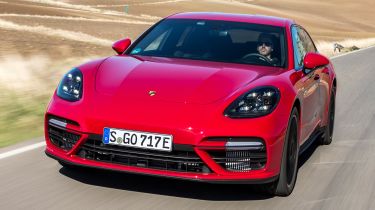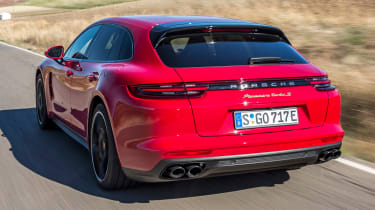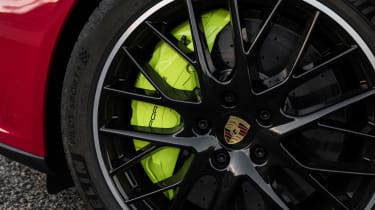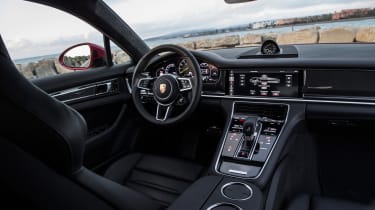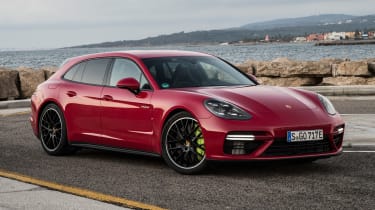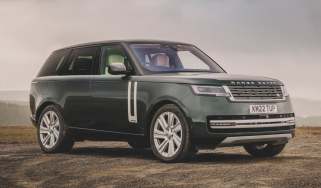New Porsche Panamera Turbo S E-Hybrid Sport Turismo 2017 review
Porsche’s sleek Panamera Sport Turismo estate gets boosted plug-in performance, with 671bhp and 850Nm

As a technical exercise it’s impossible not to be impressed by Porsche’s hybrid integration with its new range-topping Sport Turismo. There’s ridiculous pace and huge agility, while its low emissions will please the tax man, too. However, the V6-powered Panamera 4 S E-Hybrid does the latter without the Turbo S E-Hybrid’s massive price, while the petrol-only Turbo is the better outright sporting choice.
The Turbo S badge is one reserved for the fastest, maddest models in Porsche’s line-up, and it’s just been tacked onto the hatchback door of the new Panamera Sport Turismo.
By doing so, Porsche has upped the power from the 4.0-litre twin turbo V8 that powers the standard Turbo, adding a parallel hybrid powertrain. This has not only created the most powerful Panamera ever, with a faintly ludicrous 671bhp, but the one with the longest name.
Officially, the car you see here is called the Panamera Turbo S E-Hybrid Sport Turismo, but it’d be an impressive feat to place that on shapely backside of the Sport Turismo estate. It’s just the Panamera Turbo S there, the acid green outline highlighting to those in the know that Porsche’s highest performance Panamera is also electrically-charged.
The company isn’t afraid to admit that this car’s hybrid module is all about performance. Yes, there are some efficiency benefits of popping a 136bhp, 400Nm electric motor between the 4.0-litre V8 and the eight-speed PDK automatic transmission, but really, it’s all about the combined output. The lofty numbers are enough for Porsche to lay claim to the title of the world’s most powerful estate car – the fact it’ll drive up to 30 miles on battery power alone is merely a conscience-salving bonus.
Used - available now

2022 Toyota
Corolla
105,000 milesAutomaticPetrol1.8L
Cash £9,990
2021 Vauxhall
Corsa
89,165 milesManualPetrol1.2L
Cash £5,990
2026 BMW
i4
53,732 milesAutomaticElectric
Cash £23,990
2023 Audi
e-tron
49,832 milesAutomaticElectric
Cash £15,500There’s a trade-off with all the hybrid technology, however. The Turbo S E-Hybrid loses 95 litres of bootspace over a conventional Sport Turismo, while also adding a 215kg weight penalty.
In spite of its ample bulk, the numbers associated with it are certainly deserving of that Turbo S status. With four-wheel drive, all that additional power and torque and wider rear tyres, it’ll reach 62mph in 3.4 seconds – two tenths of a second quicker than a Sport Chrono-equipped Turbo. Keep the accelerator pushed hard to the floor and it’ll double that in 11.9 seconds – on to a slightly higher 192mph top speed, too.
The weight does little to blunt the Turbo S’s agility, thanks in no small part to Porsche’s specification of almost every available chassis system as standard. There is adaptive, three-chamber air suspension with Porsche Active Suspension Management, Porsche Dynamic Chassis Control Sport and Porsche Torque Vectoring Plus, as well as Porsche Ceramic Composite Brakes.
All that wizardry is managed by Porsche’s 4D Chassis Control. Indeed, the only option you can add to the already lengthy list of agility-enhancing acronyms is rear axle steering. It’s inconceivable that any buyers at this price point won’t do so, as it does wonders in shrinking the Panamera’s size, markedly improving the turn-in response. The steering itself offers fine weight, if not masses of feel, and the suspension rides with a suppleness that’s limo-like in its Comfort setting and taut and controlled in its more sporting choices. Only the odd ridge upsets the air suspension’s composure.
The standard ceramic PCCB brakes do a great job of hauling back all that mass, even if the pedal feel isn’t quite as incisive as its non-hybrid relations.
There’s active aerodynamics to help should you chance upon a high speed run on the autobahn. Here, the Panamera Turbo S E-Hybrid Sport Turismo accelerates with seemingly endless urge. That’s facilitated by the huge 850Nm of torque – produced in a flat line from 1,400rpm to 5,600rpm. It is that which defines the performance.
The elasticity of response from that hugely powerful hybrid powertrain brings always-available pace, in fact. With that comes some unusual, and not necessarily entirely welcome traits, however, at least when applied to the Turbo S badge here.
There’s plentiful force but little actual drama. The ordinary Panamera Turbo does acceleration that’s vivid, brutal and backed with a rousing, often unruly soundtrack. The sound made by a Mercedes-AMG E 63 estate or Audi RS6 will leave you tingling in comparison, too. They’re more practical, as well.
Yes, the Turbo S E-Hybrid has the ability to readjust your internals in Sport or Sport+ modes with its acceleration and cornering ability, but it loses the visceral edge of its conventionally-powered relation and rocketship rivals. The force it generates is more linear, yet less unhinged despite the numbers associated with it.
It’ll bend time, but it does so in an almost apologetic, muted fashion, with the hybrid system civilising its performance, crazy as that might sound.
The actual advantages it brings then are arguably negated. A similarly-equipped Turbo will be just as quick in the real world, needs less management of its powertrain and, thanks to the reduced bulk, make more from the chassis. With the Turbo S the huge specification feels like it’s there to compensate rather than to enhance, which is somewhat at odds with the expectation of the badge it wears.
For those interested in running costs, and bizarrely, many will be – the Turbo S E-Hybrid emits just 69g/km of CO2, while allegedly returning almost 100mpg. You’ll need a relatively short commute and regular access to a charge point to realise those numbers, but company bosses looking to minimise their tax bills will be pleased to see it sits in the same (13 per cent) bracket as a Toyota Prius.
